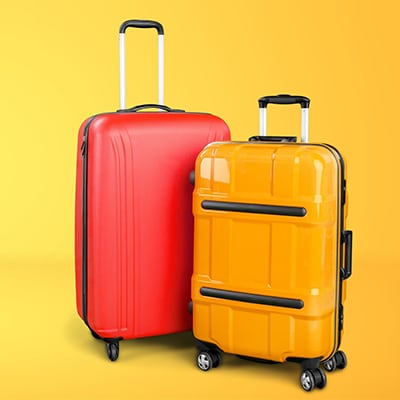Holiday Gut Handbook
There are so many opportunities for celebration starting in October and going through to the New Year.
This could potentially mean you have a lot of traveling to do.
Traveling and being off your routine can make for a messy time if you suffer from IBS or any other gut problems.
But don’t worry, we’ve got you covered.
Our Holiday Gut Handbook will have you feeling at your best no matter where the season takes you!
Avoid Your Triggers
Typically with health issues, people immediately think of food as being the only trigger.
This isn’t necessarily true.
With syndromes and disorders like IBS, you can have other things that cause you to have flare-ups.
Some common triggers for IBS and other conditions include:
- Certain foods
- Stress
- Getting off your normal routine
- Lack of self-care
- Lack of sleep
Foods to Avoid During the Holidays
Avoiding all trigger foods may be difficult, especially if your favorites contain ingredients that cause you discomfort.
In addition, everyone suffers differently so what may trigger one person might not have any effect on another.
Some of the ingredients/foods that might cause you grief include:
- Milk/Dairy
- Gluten/Wheat
- Spicy foods
- High levels of caffeine
- Excessive fats (do not exceed 40-50 grams/day)
- Certain dietary fibers especially bran
- Alcohol
- If your doctor suggests the low FODMAP diet then avoid as many of these as you can
- Onions
- Garlic
- Apples
- Honey
- Avocados
- Pears
- Legumes
- Nuts
- Cauliflower
- Mushrooms
** NOTE: Because the low FODMAP diet excludes so many healthy foods you need to be instructed by your doctor to follow this diet. Make sure you aren’t excluding foods without talking to your doctor first.
Serious nutritional deficiencies can result from extreme diets like the low FODMAP diet if done for too long or the wrong way.**
Ideas to make sure you avoid triggers this holiday season:
- Potluck-style dinners (have everyone bring recipe cards for their dish to let people know of potential triggers)
- Notify the chef ahead of time what your triggers are so they can accommodate you
- Ask the chef what ingredients were used in potential trigger foods
- Bring your own dish to add to the mix to make sure you have something you can eat
How to Avoid Stress During the Holidays
Stress is something that we can’t completely avoid, especially when it comes to the craziness of the holiday season.
Stress is necessary for some situations where you need to be able to respond quickly and take action, but a constant state of stress leads to systemic inflammation and ultimately disease.
Traveling, cooking, buying gifts, scheduling visits, and being around certain people understandably skyrocket your stress levels.
Just because it’s understandable doesn’t mean that it isn’t dangerous to your health.
Managing your stress allows your body to function properly without excessive amounts of hormones like cortisol swarming throughout you.
High stress levels have been shown to exacerbate IBS and other gastrointestinal disorders since cortisol levels increase.
Some proven ways to manage stress if you suffer from IBS include:
- Yoga — decreases abdominal pain, improves sleep quality
- Cognitive behavior therapy (CBT) — seems to be the best way to manage stress and IBS symptoms
- Mindfulness-based stress reduction (MBSR) — this technique helps manage stress, anxiety, depression, and chronic pain disorders. Using MBSR techniques IBS patients saw results even 6 months after stopping the program by still implementing what they learned to manage stress.
- Prebiotics — because prebiotics bypass your small intestines and ferment in your colon your body is able to extract more nutrients from them.
They are able to then create short-chain fatty acids and other helpful byproducts that repair your gut permeability and therefore the rest of your body as well.
Avoid Overeating
Overeating is something we all do when we go home for that special dinner with our family and close friends.
Although the binging is a normal practice, it doesn’t mean that it’s a healthy one.
When you avoid eating all day and then you dump a ton of food into your stomach in a short amount of time, your body doesn’t know how to properly digest it all.
More than likely you’ll end up with a nasty stomachache and potentially be running to the bathroom.
To prevent overeating without completely spoiling your family dinner, try snacking throughout the day.
Eating small healthy snacks keeps your digestive juices warmed up and keeps your tummy happy while keeping it mostly on its normal schedule.
Avoid Alcohol
We did mention alcohol above in the foods to avoid section, but alcohol is such a common holiday tradition that it needs to be reiterated.
Unless you know how much or what kind of alcohol you can drink without it irritating your stomach, it should be avoided.
Alcohol has been proven to increase intestinal permeability causing inflammation in your gut and throughout your body.
So if you’re looking to avoid stomach problems, you should probably lay off the eggnog this year.
Prepare, Prepare, Prepare
Planning out your trip ahead of time can help you to feel more ready and less stressed.
To make sure that your gut and vacation are as stress-free as possible, try some of these tips so everything is a little more smooth.
- Avoid your triggers.
- Plan food and bathroom times.
- Train your body to go to the bathroom at times that you won’t be traveling.
- Map out where the nearest bathrooms are (there are apps for this and to find clean ones).
- Book aisle seats if you’re on a plane, bus, or train.
- Pack a travel bag with potential emergency essentials:
- Extra pants
- Extra underwear
- Flushable wipes
- Medications (diarrhea, constipation, pain relief, etc.)
- Have bottled water on hand to keep hydrated to avoid constipation and dehydration.
- Pack healthy snacks to keep your eating schedule normal.
- Expect setbacks, delays, and other problems to arise. Plan ahead of time how you can deal with them so you aren’t overly stressed out should something happen.
- Make sure to bring your Atrantil and take it!
The
Peppermint in Atrantil will help to calm and soothe the stomach, while the other ingredients will help fight free radicals and inflammation in your body and reduce methane gas produced when certain foods are consumed.When all else fails, take your Atrantil!
What are your best ways to avoid holiday issues?
Let us know in the comments below!



Is Triphala something you would recommend taking along with Atrantil? Or should I see how Atrantil works on its own first?
Hi happyhanny80,
Thank you for your interest in Atrantil. It is ok to take Triphala while taking Atrantil. However, when testing Atrantil, we had over 80% efficacy for those with bloating and abdominal discomfort, with/without diarrhea, constipation or both, when taking Atrantil alone. So it is really up to you if you would like to take them at the same time or try Atrantil alone first. We hope this helps to clarify.
Best wishes,
Support Team